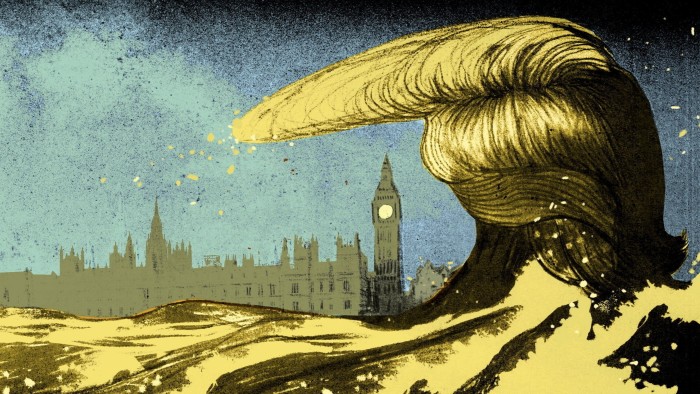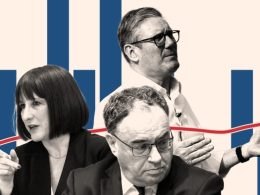Unlock the White House Watch newsletter for free
Your guide to what the 2024 US election means for Washington and the world
Now where have we heard these words before? Peter Mandelson, the former cabinet minister and EU commissioner now widely touted in Labour circles as the next ambassador to Washington, has pronounced that in navigating its relationship between the EU and a Trump-led America, Britain needs to “have our cake and eat it”.
Mandelson is no Boris Johnson, so his adoption of the former prime minister’s cakeist Brexit mantra offers a hint of the government’s early thinking on how to respond to the new reality.
The first days since Donald Trump’s victory have provoked strong opinions, most of which argue the UK must now do whatever the commentator already wanted to see happen.
Left Remainers see a chance for closer ties with the EU in the horror of Trump 2. The free-trade Brexit dream is over and, with an unreliable Atlantic ally and looming trade war, the UK cannot risk being squashed between two blocs. On the environment, European security and maintaining multilateral order, the UK aligns with the EU. Keir Starmer may have ruled out rejoining its structures this parliament but policy can tilt faster towards regulatory realignment and security pacts.
Brexiters are similarly excited. Here at last is that coveted UK-US free-trade deal, which could further push Britain out of the EU’s regulatory orbit. The UK has too many defence and trade interests to abandon the Atlantic alliance, so the only option is to double down on it. Throw in hawkishness on China and doubts over the stability of European leadership and the play is obvious.
It is possible that Trump’s second term is so shocking that judgments change but choosing sides is not in Britain’s interest. Both alliances must be sustained. There is no benefit to being pulled further from an EU with which Britain has just begun to rebuild ties and no prospect of the UK walking away from the Atlantic alliance. In any case, all the grand strategies assume a degree of agency the UK may not have.
So, in the words of one diplomatic source with an eye for a happy phrase, Britain must “relearn the art of the deal”. The nation’s diplomatic and economic stance needs to be more transactional. Realpolitik will rule. That means minimising unwanted choices and advancing UK interests through ad hoc alliances built around specific goals. Tying America to a shared agenda will not be easy. Trump will be even less biddable second time around and the value of his anglophilia is overstated.
With the US, Britain will lean on intelligence and defence ties as it seeks to keep America engaged in Europe. US demands for higher defence spending are a necessary and fair price for maintaining Nato and some of that can be spent in America. While arguing for free trade, the UK will also seek to minimise direct tariff disruption, and since its exports are services-led, its small goods surplus should push it lower down Trump’s targets. A full trade deal will not be the primary focus, but if a politically sellable agreement that does not limit opportunities with the EU is on offer, then of course Britain will take it.
Some point to last year’s Atlantic Declaration between Rishi Sunak and Joe Biden as a template. Security — including the Aukus defence pact — defence technology, life sciences and artificial intelligence will be the overlapping areas of interest, and ones where the UK is closer to American regulatory instincts.
With the EU, the focus will be on defence and energy security, data sharing, easing obstacles to market access and some form of youth mobility scheme. Starmer and David Lammy, foreign secretary, are working to reinsert the UK into EU structures, primarily via a new security pact.
The UK is going to be buffeted by big power politics. It can neither afford to repel nor cosy up to China but it is already putting more diplomatic effort into Beijing while emphasising alliances with Japan and Australia.
Relearning the art of the deal also means acting with more humility, coaxing rather than demanding, and avoiding jingoistic stances that win temporary cheers in the press but alienate potential allies. The UK must act as a middle power, outside of rival economic blocs, weaving between the EU and US, being a strong voice and building alliances for causes it supports, as it has with Ukraine and climate change.
Recent Foreign Office reviews demanded by Lammy, who anticipated Trump’s win, have focused on economic diplomacy and on working with the global south (where the west has lost ground to China), while the Budget found more funding for the soft power of the BBC World Service.
This then is a vision of Britain on its mettle. And if that all sounds a little familiar, there is a reason. For this is an updated vision of the freewheeling Global Britain that Johnson and the Brexiters championed. As then, such statecraft is easier to articulate than achieve but for now at least it may be the best available model.
Before the US election, most in Labour saw a future in which they drew closer to the EU with the blessing of the White House and all worked together on shared security and climate goals.
The new president has changed that calculation. Labour remains too pro-EU to be pushed from its orbit. But in forcing the UK to adjust to a new and unwelcome world order, it may well be that Trump becomes the man who delivers the original diplomatic vision of Brexit.
Source link









